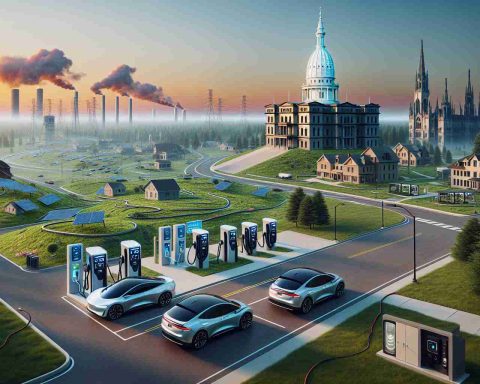Charging Towards the Future
In a pivotal move towards a sustainable future, Michigan has launched its inaugural electric vehicle (EV) fast charger, signaling a transformative leap in the state’s green transportation efforts. Positioned at Meijer in Lansing, this strategic development showcases Michigan’s commitment to revolutionizing EV infrastructure, spearheaded by the National Electric Vehicle Infrastructure (NEVI) program and the Rivian Adventure Network.
A Catalyst for Cleaner Transportation
This advanced charging station features six fast chargers, supremely engineered with one for trailers, facilitating all kinds of EVs. This marks a significant step to alleviate range concerns for drivers and bolster the transition to eco-friendly transportation.
Michigan’s Roadmap to an Electrified Future
As part of an ambitious target to register 2 million EVs by 2030, Michigan’s strategy aligns with a broader national agenda promoting EV infrastructure, thanks to President Biden’s Bipartisan Infrastructure Law. This law emphasizes the need for easily accessible, round-the-clock charging services situated along alternative energy routes.
Electrifying Plans for Expansion
Looking ahead, Michigan plans to inject $110 million from the NEVI program by 2026, establishing over 100 fast charging locations. Seven additional stations are currently in the design phase, aiming to be operational by early 2025, reinforcing the state’s dedication to clean energy pathways complemented by initiatives like the MI Healthy Climate Plan.
Inclusive Access and Environmental Benefits
Although part of the Rivian network, this charger is available to all EV owners, extending benefits that echo across environmental and accessibility fronts. It symbolizes more than just a fuelling point; it stands as a testament to sustainable innovation and community-wide inclusivity.
Towards a Sustainable Tomorrow
Michigan’s first fast charger is not just a renewable energy milestone but a vision of a futuristic transport system. As the state embraces this new chapter, it sets the pace for a nation eager to delve into cleaner, more efficient electric mobility.
Riding the Wave of EV Innovation: Michigan’s Leap Into Fast Charging
Unveiling the Latest in EV Charging Trends
The launch of Michigan’s first electric vehicle (EV) fast charger at Meijer in Lansing marks a significant milestone in the state’s electrification journey. Beyond its immediate benefits, this installation is a harbinger of broader trends reshaping how we perceive and utilize electric mobility. With the support of the National Electric Vehicle Infrastructure (NEVI) program and the Rivian Adventure Network, Michigan is accelerating towards a more sustainable transportation future.
Enhancements and Features of Michigan’s Charging Station
The cutting-edge charging station is equipped with six fast chargers that cater to a diverse range of EVs, including one specifically designed for trailers. This sophisticated setup addresses EV range anxiety—a common concern among potential electric vehicle buyers—and represents a commitment to meeting the comprehensive needs of modern drivers.
Pricing Models and Cost Implications
Although specific pricing models for the new chargers are yet to be detailed, such stations generally feature tiered pricing structures that accommodate differing charging speeds and times. These economic considerations are essential for encouraging widespread adoption and provide insight into future billing setups consumers might expect.
Comparative Analysis: Michigan vs. Other States
Michigan’s investment in EV infrastructure parallels initiatives in other progressive states like California and New York, yet distinguishes itself through strategic partnerships like those with the Rivian Adventure Network. Such alliances promise advanced technological integration, ensuring seamless user experiences and spearheading collaborative progress across the electric landscape.
Security and Compatibility Insights
One key aspect of Michigan’s charging stations involves heightened security measures to protect user data and safeguard the charging network. Additionally, these stations boast compatibility with various EV brands and models, including those from Tesla and mainstream automobile manufacturers. This wide-ranging compatibility underscores the state’s forward-thinking approach to infrastructure development.
Predicting the Future of EV Charging in Michigan
Looking ahead, by maximizing its $110 million allocation from the NEVI program, Michigan is set to expand its fast-charging network significantly. Predictions suggest that by 2026, the state will house over 100 fast charging locations, transforming it into a pivotal EV hub in the Midwest. Such expansive growth hints at emerging trends in real estate and technological synergies that will shape the future landscape of mobility.
Rough Terrain: Potential Challenges and Limitations
Despite these advancements, challenges remain, including balancing the demand for electric energy with infrastructure capacity, maintaining environmental priorities, and ensuring equitable access across diverse communities.
Learn More and Stay Updated
For those interested in exploring more about electric mobility and advancements within the state, visit the primary domain Michigan Government for comprehensive resources and continual updates.
This transformative leap forward not only electrifies the roads of Michigan but also paves the path for a sustainable tomorrow, setting a precedent for eco-conscious innovation statewide and nationwide.








